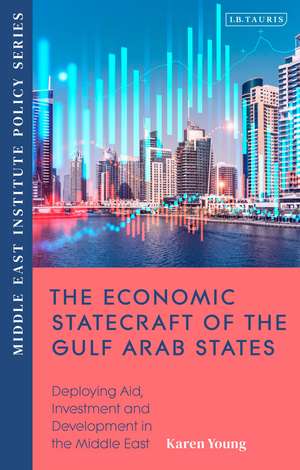The Economic Statecraft of the Gulf Arab States: Deploying Aid, Investment and Development Across the MENAP: Middle East Institute Policy Series
Autor Karen E. Youngen Limba Engleză Paperback – 25 ian 2023
| Toate formatele și edițiile | Preț | Express |
|---|---|---|
| Paperback (1) | 131.64 lei 3-5 săpt. | +21.04 lei 7-11 zile |
| Bloomsbury Publishing – 25 ian 2023 | 131.64 lei 3-5 săpt. | +21.04 lei 7-11 zile |
| Hardback (1) | 404.71 lei 6-8 săpt. | |
| Bloomsbury Publishing – 25 ian 2023 | 404.71 lei 6-8 săpt. |
Preț: 131.64 lei
Preț vechi: 143.70 lei
-8% Nou
Puncte Express: 197
Preț estimativ în valută:
25.20€ • 26.47$ • 21.18£
25.20€ • 26.47$ • 21.18£
Carte disponibilă
Livrare economică 18 februarie-04 martie
Livrare express 04-08 februarie pentru 31.03 lei
Preluare comenzi: 021 569.72.76
Specificații
ISBN-13: 9780755646661
ISBN-10: 0755646665
Pagini: 192
Dimensiuni: 138 x 216 x 16 mm
Greutate: 0.22 kg
Editura: Bloomsbury Publishing
Colecția I.B.Tauris
Seria Middle East Institute Policy Series
Locul publicării:London, United Kingdom
ISBN-10: 0755646665
Pagini: 192
Dimensiuni: 138 x 216 x 16 mm
Greutate: 0.22 kg
Editura: Bloomsbury Publishing
Colecția I.B.Tauris
Seria Middle East Institute Policy Series
Locul publicării:London, United Kingdom
Caracteristici
Demonstrates that new economic statecraft in a South-South direction allows governments in the developing world or emerging markets to combine their foreign policy goals with their own economic development priorities
Notă biografică
KAREN E. YOUNG is Senior Research Scholar at Columbia University, USA, in the Center for Global Energy Policy. She was a senior fellow and founding director of the Program on Economics and Energy at the Middle East Institute, USA. She was a senior fellow at the American Enterprise Institute, USA. She has published The Political Economy of Energy, Finance and Security in the United Arab Emirates (2014) and her analysis has appeared in Bloomberg Opinion, Foreign Affairs, Foreign Policy, The Financial Times, The New York Times, The Wall Street Journal, and The Washington Post.
Cuprins
Introduction: Master Developers of the GulfChapter 1: Political Economy of Development from Bretton Woods to Authoritarian CapitalismChapter 2: The Gulf in the Global Economy and Post-Oil Era Chapter 3: Case Studies of Gulf Financial Intervention: Egypt and EthiopiaChapter 4: Between the Gulf and China: Case studies of Financial Intervention inOman and PakistanChapter 7: Too Little, Too Late: Response to Development in CrisisCase studies of Sudan and YemenChapter 8: Conclusion and Policy Recommendations
Recenzii
Karen Young explores two issues central to the future of development in the broader Middle East region in this book. First, how Gulf economic statecraft is affecting and will affect the development trajectory of the countries that receive Gulf aid and investment. Second, how the Chinese and Gulf development models and policies in the region both challenge the Washington consensus and compete with each other. The book is a welcome primer to how to understand these key issues.
This meticulously detailed and extraordinarily timely analysis of economic statecraft in the context of the Gulf Arab States sheds valuable light on the political motivations and policy tools that are reshaping patterns of aid, development, and investment strategies across the Middle East and North Africa at a time of enormous volatility and great uncertainty in the global economic and energy landscape.
This meticulously detailed and extraordinarily timely analysis of economic statecraft in the context of the Gulf Arab States sheds valuable light on the political motivations and policy tools that are reshaping patterns of aid, development, and investment strategies across the Middle East and North Africa at a time of enormous volatility and great uncertainty in the global economic and energy landscape.





